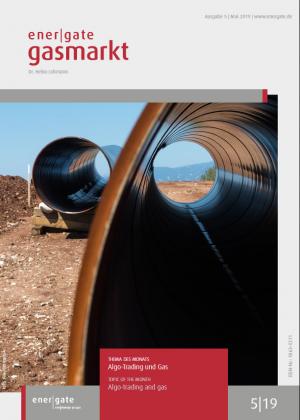Market participants should slowly adjust to the fact that Nord Stream 2 will not be ready by the end of 2019. In April, the project company of the pipeline published on its website a lengthy press release. The main message: Nord Stream had to apply for a new route around Denmark. After the southern route and the northern route (both around the isle of Bornholm; see the graph in the market rumour section of the previous edition), the Danish energy agency now had to apply for permission for a new southern route. The background: Poland and Denmark agreed to swap zones in the Baltic Sea. Now Denmark has a new piece of exclusive economic zone south of Bornholm (for Poland, the swap makes sense because of the Baltic Pipeline). The Danes now want Nord Stream 2 to file a new application for the new southern route. However, this would make a new environmental assessment necessary. This would take time and definitely not be ready early enough for the pipeline to be completed by the end of the year. The project company accuses Denmark of delaying the project on purpose. But it is unlikely that Nord Stream 2 will be able to avoid the delay. Therefore, there is an urgent need for gas from Gazprom and Naftogaz Ukraine, or the future independent Ukrainian system operator (its creation is also a difficult process), to agree on some form of transit agreement beyond 2019. The current transit contract expires at the end of this year. The longer this takes, the more likely the associated risk will be visible in the market prices (see chapter 3.1.2.1).
Stay up to date with the free Gasmarkt-Newsletter! We will inform you about new issues by e-mail and give you an insight into the contents.
- All Issues
- energate Gasmarkt
- Issue 05|19
- Issue title:
Algo-Trading and gas
- Publication date:
- 08.05.2019
- In this issue:
I don‘t think I have ever made an edition with so many IT-related topics. The topic of the month is auto and algo-trading in the gas market. For this topic, I visited VisoTech in Vienna. The company is no longer a start-up and located in an industrial zone, which is anything but exciting. But the atmosphere and the equipment are as one would expect in a company that works on digital innovations - you might, for instance, meet a barefoot developer strolling down the corridor. However, the managing director Jürgen Mayerhofer is focused more on figures and sales, although he is still young and has vision. So far, gas trading and auto-trading have not gone together very smoothly, as the report shows.
Although Alexey Mileev isn‘t young, he has his sights set on ending inefficiencies in European gas transportation at the expense of TSOs and to the benefit of traders. Two years ago, he started in Riga with Route4Gas, and sales will kick off in September. The idea behind the company is presented in this edition.
IT also plays an important role for EGSSIS, but the business model does not rest entirely on IT-based services, as Stefan Quentin explains in an interview. At the end of the day, EGSSIS is an established provider of services for operations in the gas and power markets. Tom Dufraing, a former Distrigas manager, founded the company in 2008. What is new is the extension of the organisation and sales beyond Belgium.
There was quite a stir around the Law on the Acceleration of Energy Network Construction. To be honest, ener|gate Gasmarkt needed a while to understand the relevance of this excitement for the gas sector. The law is an omnibus bill that amends 20 different laws and ordinance provisions to speed up the extension of the German power network (the already existing Law on the Acceleration of Network Extension (NABEG) is among the laws that were amended). The upper house of parliament (Bundesrat) had to approve the new law, and in its statement demanded a number of adjustments to the draft of the government. One of the changes concerns section 43 of the Energy Act (EnWG) that regulates the formal planning procedures for the gas and power transmission networks. The responsible state authorities are in charge of these procedures. In future, the regionalstate authorities are to have the right to approve not only gas and power networks but also plants that couple networks, and large storage plants with a capacity of more than 50 MW. This was newly added to the law.
Sales Contact

Frequently Asked Questions
1. What is the energate Gasmarkt?
The energate Gasmarkt provides specialists and executives in the gas industry with up-to-date information and background information on the German and international gas market. The medium expertly explains the most important developments in the fields of market, law, politics and business. In addition, the energate Gasmarkt offers insider information such as market rumors and personal details.
2. What is the energate Jahresreport Gas?
The energate Jahresreport Gas traces the most important market developments of the year and provides a well-founded outlook for the coming months. Gas expert and insider Dr. Heiko Lohmann analyzes relevant events in politics, law and regulation as well as on generation, infrastructure and trade. In addition, the report provides information on changes in the corporate landscape and tracks price developments in market reports. Top decision-makers from the industry use the Jahresreport Gas as a compact chronicle of the year and to assess future market developments.
3. How often are these publications released and in which formats are they available?
The energate Gasmarkt is published monthly. Subscribers will receive the energate Gasmarkt as a print and PDF version in German and English. The Jahresreport Gas is published annually (beginning of December).
4. Can I purchase individual issues of the energate Gasmarkt?
Yes, you can purchase individual isses as print or PDF version. Payment options include purchase on account, credit card or PayPal.
5. How much is a subscription of the energate Gasmarkt and how much does the Jahresreport cost?
A subscription to the energate Gasmarkt (single licence) costs 110,- Euro/month (plus VAT). An edition of the Jahresreport Gas costs regularly 390,- euro (plus VAT).
6. Are there any special conditions if several employees in a company would like to receive the Gasmarkt?
With several Gasmarkt recipients in one company, the price of the second and all other licenses is reduced significantly. We are happy to make you a fair offer for team or corporate licenses!
7. What benefits do I get by registering?
A free energate account is required to order the energate Gasmarkt or the energate Jahresreport Gas. Registered users receive an overview of the contents of the current issue of energate Gasmarkt by e-mail on the day of publication.
8. I would like to read energate Gasmarkt or energate Jahresreport Gas digitally. Where can I find my e-paper version?
As a subscriber to energate Gasmarkt or as a purchaser of energate Jahresreport Gas, you will also receive an e-paper version in addition to the print edition. You can find it at online.energate-gasmarkt.de. Please use your energate account to log in.


